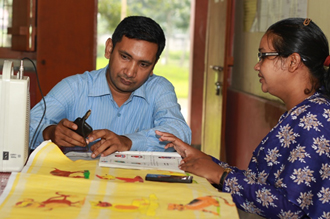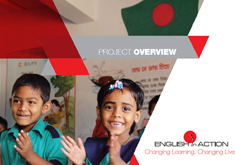Pijush, an inspiring and promising head teacher of Molickpur GPS from Kishoregonj Upazila, has made it clear that willing and enthusiastic teachers can make a huge difference in English classes – leading to much more English being used in the classroom.
In 2013, Pijush heard that many of his neighbouring school teachers were practising new more communicative teaching activities in their English classes soon after their training with EIA. He was quite curious and went to see students’ behaviour in these English classes. After 8 years of English language teaching in primary education, he could easily see what exactly was different in these classes.
Pijush inquisitively discussed with his neighbouring school head teachers to find out more about EIA training. He came across the EIA concepts especially how video materials can help change the way you teach and how classroom audios and the use of speakers could make a significant change in students being attentive and liking English classes.
What he saw, what he witnessed, he instantly believed in. Without any further delay, he contacted his Upazila Education Officer (UEO) to help him procure a speaker to play EIA audio materials. Meanwhile he went to see a teacher in a neighbouring school and transferred the EIA audio-visual materials to his smartphone. He immediately watched and listened to the audio-video materials on professional development and classroom activities. He started counting the days as to how soon he could get hold of the speaker and become a part of the revolution already taking place in Kishoregonj.

To procure a speaker, in fact, to procure anything in local level administration, is a process driven and time consuming task. He kept on visiting and influencing the UEO to ensure the speaker would arrive for his school.
Pijush’s wait was soon over, once the UEO, Siddiqur Rahman, became a believer of EIA. Pijush was handed a speaker for his school. In the meantime, he had also made sure that the SMC members knew about the benefits of EIA approaches in the classroom. To prove the point, he managed to take SMC representatives to other neighbouring schools where EIA was already actively present.
EIA arranged a one-day orientation for teachers and head teachers, like Pijush, in the Kishoregonj area to introduce how EIA approaches may most effectively be used in the classroom.
Pijush’s school has 290 students, 156 girls and 134 boys. Almost all of them belong to struggling families, who are farmers and fishermen. These students are now part of EIA. Every week English classes are now exciting for these children and fulfilling for their teachers.
“The students in my school belong to remote areas and are part of struggling families. Having brought EIA into my school, I know I am going to make a difference in their lives. I don’t wish to see my children go fishing, but go for government jobs.”
Pijush, as a head teacher, also spends time with his fellow teachers helping them practise new EIA approaches in their classroom.
When asked what was the one thing which kept him going despite many challenges, including the administrative procedure, convincing the UEO, AUEO, SMC and other teachers at times, Pijush said…“usually in classes you don’t see students smile. The first thing I saw in an EIA teacher’s class were they were actually smiling, having fun, while I knew they were learning new things. I would have blamed myself if I did not manage to ensure such opportunities for my students in the school. They are my responsibility and I want to do as much as I can despite as little as I have”.

This endeavour and commitment of change has not only provided Pijush an opportunity to become a life changer for over 300 students — but in 2015 he was nominated and later selected as the best teacher of the Upazila – spreading his belief across a larger audience.
EIA is an idea, a proven one, which works to make changes in classrooms and to have a practical impact on students’ learning. Stories, like Pijush, prove further how this one idea and one person’s determination can continue to change lives by changing learning.
Teachers on EIA make changes to their teaching practice by following a “learning-by-doing” process (see- plan-practise-do-reflect-share). Teachers watch EIA videos showing new techniques on their mobile phone. Teachers help each other plan how they can apply the new techniques in their regular lessons. Teachers then use the techniques in their regular lessons. They reflect on the experience of using new techniques and share experiences, ideas and learning with other teachers.
These elements can be seen in Pijush’s story. He heard about something new and exciting in classes in nearby schools and went to see for himself and took others from his school to see too. Pijush talked to another teacher to get hold of the new materials and talked about how they could be used. Pijush tried out the new techniques in his classroom and is motivated by the response and engagement of his students. He thinks about what is working well and could be improved, and does this through talking with other teachers in his school.
“I used to go about taking classes before EIA through using IPT technique - Input Practice Task, very traditional classes what I have been doing for years now, and I read out lessons and gave them task and sometimes assigned group work or individual reading. I would have asked them to read five lines and memorise it. After EIA, since 5 months, my attitude and students attitude towards lessons have changed, I use the audio lesson to increase students attention to the pronunciation, the other day I was teaching in Class 4 the lesson on ‘Visit to the Liberation War Museum’ and I used the Stop Game I got to know from EIA training, I blended my existing ideas and new ideas from EIA and I would make mistakes in the lesson voluntarily for students to correct me”.
According to Pijush, Children are very confident with English now and some positive results in writing and readings skills are also noticed in his class. He is expecting all his students will try to obtain A+ in English when the pass out Class 5.
Despite many challenges in regards to the school itself, like no adequate toilet facilities let alone separate for girls and boys, no electricity connection, Pijush as a head teacher is staying optimistic. He has influenced local parents and SMC members and acquired some portion of land at the backyard of the school for Wash Block project where toilets for girls will be separate, hygienic and safe. On the other hand, he takes the Speaker which he got for the school to a different area to charge it to be used in the class next day.
With 1:70 Teacher student ratio, with so much challenge what keeps Pijush going is his commitment towards his profession. “I have four sisters to take care and earn living for my family being the only bread, I started my career as a part-time teacher tutoring students and even my friends since 1994. Since then I knew through teaching, I can make difference in my life and in others as well”.






